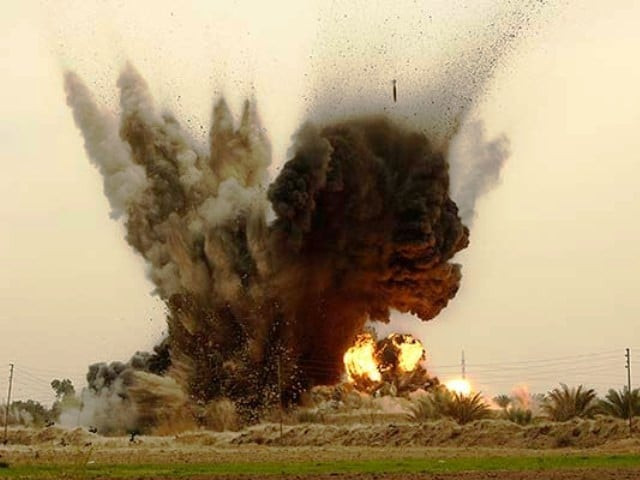Two fighters enter a ring to fight over a title.
The decision has been made; or been made public, at least.
The war is ours, finally. The time for talks, indeed, is over. Pakistan Army has launched an operation against the militants in North Waziristan Agency (NWA).
After all these years, and the loss of so many dear lives, we’ve been jolted into action. Over the next few days, details will pour in of exactly what and how the Army hopes to achieve from this operation. And over the next few years, of course, we’ll get to see the ramifications materialise in our daily lives, too. The military operation might be underway in NWA, but it is going to spill over in other parts of the country as well.
This is not the first operation against the militants, and Pakistan is not the first country in the world to launch a retaliatory operation against a domestic threat either. In fact, Zarb-e-Azb is the tenth operation undertaken by the Pakistan Army since 2007. But, the battle lines, ever so murky over the last few years, have finally been drawn clearly. Similar insurgencies have been fought all over the world. Very recently, Sri Lanka has successfully concluded a 30-year struggle with its own rebels. One can only hope that it will not take us that long to do so.
Both are battle-hardened, and have proved their mettle in the arena.
But we shouldn’t feel heroic just yet. Bear in mind that the international community has been coaxing, and sometimes even forcing, us to eliminate the militant threat for a long time now. Pakistan’s secretive harbouring of terrorist groups in the past has not been very conducive for our international image, either. Moreover, the decision to launch the operation, coming at a crucial time, will generate some monumental bickering within our ranks.
Why an operation? Why so late? Why now? Does the recent insurgency in Iraq have anything to do with this? What about talks? Who’s providing the funding? Surely, the missiles will separate the good militants from the bad ones, right? Will we allow the militants to lay down arms and follow the state’s writ? Do the ends justify the means?
Some of the questions will be legitimate, and further our understanding of the conflict; others, not so much. The ‘analysts’ and the TV presenters will run themselves hoarse while providing their ‘analyses’. But know this: there are no easy answers.
It is time for us, as a nation, to stand firm. But while doing so, we must not allow anger to cloud our sensibilities, and lose sight of the broader issue. Zarb-e-Azb is going to define Pakistan’s future, and there are some very pertinent matters that have to be kept in mind.
First of all, as a result of the military conflict, the rest of the country will see a wave of internally displaced persons (IDPs) flocking to the safer areas of the land. While the Pakistani state should provide safe passage to the displaced, stringent checks will have to be made to ensure that militants are not allowed to escape into other regions of the country in this way. Furthermore, if the operation runs long (and I have a feeling it might), the IDPs will have to be integrated into the national mainstream through efficient management of human and physical resources.
Secondly, with the Army busy on the Western frontier, it is time for Pakistan to get more regional and international support behind this endeavour. Rather than playing the oft over-played ‘victim’ card, Pakistan should take ownership, and have the wherewithal to see the operation through. It is an opportunity to improve relations with the neighbours, which will allow us to focus on the issue at hand, and not let our energies be diverted. The safe havens in North Waziristan have been a cause of concern for quite some time, so hopefully the operation will provide the impetus to a broader regional cooperation.
Thirdly, the contested Durand Line, that serves as the territorial border between Pakistan and Afghanistan, must be made less (read non) porous, to not let the militants take refuge in Afghan land during times of heavy conflict. Without an effective control of the boundary, the militants will easily migrate to safer areas across the border. With the NATO forces drawing down as well at the end of this year, this contingency must be addressed.
Both invoke a divine right to the title.
Fourthly, all locations within Pakistan that can provide easy targets for the militants (and our past experience tells us that this list runs very long) to retaliate over the operation in NWA must be given hefty security upgrades. A lot of Pakistani lives have already been lost in the events leading up to this day. Efforts must be made to ensure protection and safety for all citizens. Pakistan is going to be at war now, and a dedicated drive can be launched nation-wide, to educate the masses on the necessity for the operation, and provide guidelines for individual and communal safety.
But… only one of them will be left standing by the end of it.
Lastly (and I’m fearful this might fall on deaf ears) we must learn from our past mistakes. Regardless of the outcome of the operation, we have to understand that it is not just the matter of eliminating a few militants or bombarding some remote hideouts. We know from experience that the enemy is quick to replace their fallen, so the problem here is much deeper. In order to truly eliminate the militant threat, a more moderate and multi-cultural approach has to be adopted in our daily lives, one that leaves no room for any extremist ideologies to flourish anymore.
Which of the two gets to claim God’s support, though?
Whoever wins.
[poll id="347"]



COMMENTS
Comments are moderated and generally will be posted if they are on-topic and not abusive.
For more information, please see our Comments FAQ